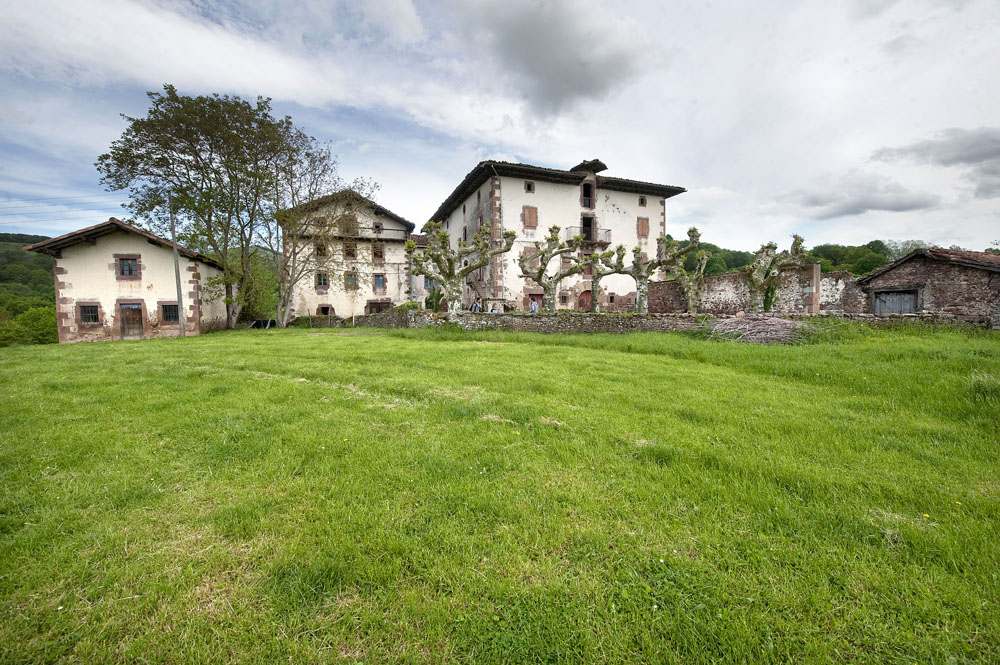Week of the black novel that lasts all year
- Around the black novel all kinds of activities are organized for seven days, they have a very full website all year round, and now they have presented the scholarship (H)Ilbeltza. From week to year, Baztango (H)Ilbeltza.

The idea was launched three years ago in Baztan: (H)Ilbeltza, week of the black novel. Since then, the black genre has been launched and various talks, round tables, presentations, walks, bertsolaris performances, etc. are being organized. They've been trained in their work, trained in popular movements, and as they dedicated themselves to the week of the black novel, they knew where and where they had to go. Before now, Elurre Iriarte, one of the organizers, has already said: “Literature has great possibilities to make social critique, and in the literature, the black novel has, above all, the opportunity to make such social critique. That's what we're interested in, social criticism. In black novels there is always corruption, there is always that subworld, very dark, which is seen in tiredness.”
Loidi and Izeta, before Redondo
Perhaps the writer Dolores Redondo, with her novel as full of successes as in Spanish, also encouraged the readers of this valley who were in her corner. They didn't like that great asots very much, and in part, to respond to it, they created the week of the black novel. They even felt pain. Many times Elurre Iriarte told us: “It seems that we have now discovered Baztan and have now discovered the black novel. We wanted to show that Baztan was here a long time ago, and it was also related to the black novel. For example, the black novel written by Mariano Izeta, the writer of Elizondo. After the famous Fifteen Days of Emergency of José Antonio Loidi, came the one of Izeta.”
Elurre iriarte (organizer):
“We wanted to show that Baztan was already here for a long time
and that it has been related to the black novel”
(H)ilbeltza no debaldan, and Loidi and Izeta are the two names that have celebrated the red alive in the week of Baztan's black novel. It was in the second edition of 2016: on the one hand, in tribute to José Antonio Loidi, they invited Anjelita, a century-old sister of the writer, and on the other, they republished the work of Izeta, with the help of the Baztan City Hall. Along with them are the works that the late Gotzon Garate put on the Baztan; to begin with, the soft hand and Elizondo’s letters. On the other hand, it is those who wrote during their stay at the Ixtola House of Sunbilla who wrote the new Plague, and the aforementioned letter Elizondo, which Garate built at the Iriarte house of Arizkun.
Experiment started by readers
(H)ilbeltza started with the readers, of them has come the week. These readers had been reading and campaigning for eight years, “Talking to Writers.” Always talking about this and that, it occurred to them to dedicate themselves to the black novel, to do something.
At first they agreed to make a conference or a weekend, but soon they realized that they had the idea of completing a program for a whole week, all around the black novel. So they started saying they didn't know what was going to come. “It was almost an experiment that first edition,” as we know Elurre Iriarte. They began in January 2015 and since then they have been three years old, and without fear of being mistaken, they have gained weight (H)ilbeltzak, they have gained presence in the week of the black novel within the literary acts held in Euskal Herria. “Ours, the winter one. In summer you have Ea Poetry Days, Zarautz Literature in spring, the Durango Fair in winter…”, always in the words of Iriarte.
However, readers who gather around the books are not working alone at the Baztan. Both local and foreign have succeeded in bringing together a large number of readers to the events that have taken place during the Black Novel in the villages of the valley. “Working days gather mostly people from Baztan, and that’s what we wanted. On the other hand, we have the criterion that events take place in the peoples of one and the other. It will be in Arizkun, in Aniz, in the other, in Erratzu, in Berroeta, in Elizondo, in Lesaka or anywhere else. And the people of Baztan move from one side to the other.” At the end of the week, they obviously come together with the baztans, especially the outsiders, people and people who have passed through the seven peoples of the Basque Country.

The week? All year round!
The week of the black novel is not, however, seven days. Those of (H)ilbeltza are always working, always black, always in sight, and we have the test ilbeltza.eus. The headquarters of the network is full of content of all kinds, with speeches and conversations about the week of the black novel, but also with escaped dialogues, reflections as a short written essay and others. If there is anyone, those of (H)ilbeltz have tried to open new paths, open the window even further to the Basque literature, pulling the black novel, always in the Baztan, out of the capital.
Aingeru Epaltza, who last year wrote the column “Beltz” in the newspaper Noticias de Navarra, and also a day in Spanish in Pamplona, in which he talked about it: “This year you will also have to compete with black Pamplona since today [(H)ilbeltzak], at an obvious disadvantage. The same, or greater, that exists from the elegance of Baluarte and the glamour to the simplicity of the rooms of Arizkun and Irurita, is among the literary systems of Castilian and Basque. Not only in size, but also between readers and journalists. This makes the effort of those working in black on initiatives such as H)ilbeltza even more rewarding.” The trajectory of these three years has shown that inside it is a soufflé of glamour, while the week of the black novel that began to be organized at the Baztan in 2015 is full of ghosts. Despite these subtle elegances of the Navarre capital and the dimensions of both, the Basque Country has had a warm welcome from the people of Baztan (H)ilbeltz, and the creators of the black initiative are aware of this. Not in vain Maitane Maritorena, in an interview with Xorroxin, said: “It’s the third year, but we’ve achieved a great centrality.”
Scholarship (H)ilbeltza
The works are being carried out well: collecting readers, attracting writers and creators of all kinds, using new air of imagination, in auzolan, carrying out an exemplary initiative between the citizens of Baztan and the political authorities at the valley level. For example, we find an excellent conclusion of the collaboration between (H)ilbeltzak and the Baztan City Hall, the scholarship (H)ilbeltza, directed with the collaboration of the editorial Txalaparta, “in order to disseminate the Basque black literature and translate the world’s black literature to the Basque Country.” Although the novelties of the bases are found in the portal mentioned above ilbeltza.eus, it should be noted that the scholarship has a prize of 6,000 euros, that works of at least 145,000 characters have been promised, and that before 23 June the sample must be presented in the register of the Baztan City Hall. The scholarship is already underway, it is the latest news that has brought (H)ilbeltz, this time nothing black.
It could be the way forward for the black novel. Until you see it, I can't tell if it will be. Two years ago, at the round table held in the week of the black novel, the writers Itxaro Borda and Jon Alonso used the same question. We have read Imanol Ibaigarriaga, professor and blogger arranondo.com: “In the opinion of Itxaro Borda, this new moment of [ceasefire] is a strengthening of forces on a daily basis (…) the black novel about the socio-economic reality of the majority of citizens (…) Jon Alonso, for his part, believes that if thirty years ago there was debate about the possibility of writing a Basque black novel, today the number of readers has grown considerably. It's a show. Meanwhile, the scholarship (H)ilbeltza, a black novel scholarship at Baztan, is already on the way.
Hilaren 24tik 30era bitartean egingo dute aurtengo (H)ilbeltza, Baztango nobela beltzaren astea. Aurtengo programazioa aurkezteko spota argitaratu dute asteazken honetan.
Aurten ez dute nobela beltzaren asterik izan Baztanen, (H)ilbeltzaren antolatzaileek urtean zehar sakabanatu baitituzte jarduerak. Asteartean jakinarazi dutenez, baina, 2022an berriz egingo dute astebeteko (H)ilbeltza jaialdia.
(H)Ilbeltza Euskal Nobela Beltzaren Asteak aurtengo edizioa iragartzeko spot-a argitaratu du urteko bigarren egunean. Beltz kutsukoa da iragarkia eta, noski, krimen baten berri ematen digu.
Ernesto Prat Urzainik Telleria eta gero, zer? aurkeztu du maiatzaren 17an Elkar argitaletxearen eskutik, bere hirugarren eleberria.
Baztango Udalak eta Txalaparta argitaletxeak euskarazko literatura beltza sustatzeko beka jarri dute martxan. 6.000 euroko laguntza dago mahai gainean, zeina kutsu beltzeko euskal nobela-proiektu onenaren egileak poltsikoratuko duen. “Nik idatziko nuke, baina ez dakit zer... [+]
(H)ilbeltza elkarteak, Baztango Udalak eta Txalaparta argitaletxeak aurkeztu dute deialdia, eta lanak ekainaren 23ra arte bidal daitezke.











ilbeltza-(1).jpg)












